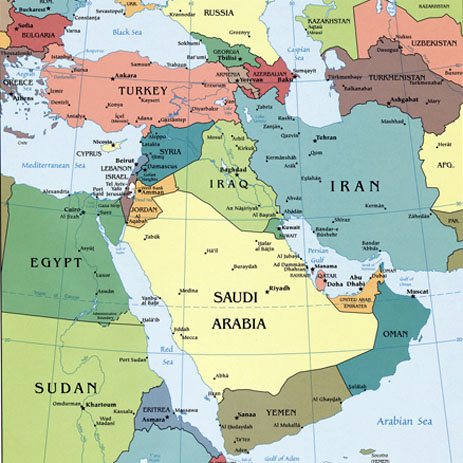A great deal of world attention is focused on the negotiations between six major powers and Iran over Iran's nuclear program. Israel is known to have over a hundred nuclear warheads although they publicly deny it. No other Middle Eastern country even has an operational nuclear power reactor. There are countries in the Middle East which are moving in the direction of acquiring nuclear power reactors which are generally seen as a first step in the creation of nuclear weapons programs. Nuclear weapons are seen by many nations to not just contribute to state security but also elevate the prestige of the nations who have them. It appears that there may be a nuclear arms race underway in that turbulent region.
The United Arab Emirates starting working on a nuclear power reactor in 2012 and expects to finish it by 2017. They have just completed the concrete dome for the reactor containment building and the overall project is about sixty percent complete.
Saudi Arabia has recently publicized its plans to construct sixteen nuclear power plants in the next twenty years. A recent visit to S.A. by South Korean officials resulted in the signing of a memo of understanding for S.K. to build two reactors for S.A. S.A. has also been making similar arrangements with China, Argentina and France for reactor construction. S.A. has plenty of oil but would rather sell it than burn it domestically. There are also rumors that S.A. has a standing order with Pakistan for the delivery of nuclear warheads if Iran creates nuclear weapons.
Jordan has contracted with Russia to build nuclear reactors. Jordan has no oil reserves and little water resources. While nuclear power reactors can help to solve the energy problem for Jordan, they could exacerbate the water problem because of the huge amounts of cooling water required by nuclear reactors.
Egypt recently announced that it was going to contract with Russia for the construction of a nuclear power reactor near Alexandria. The Russia President said at a press conference following a visit to Egypt, "If final decisions are made, it will mean not just building a nuclear power plant, it means the creation of the entire new atomic industry in Egypt."
Nuclear power reactors cost in the neighborhood of five billion dollars to construct. Poor nations like Egypt and Jordan may have trouble paying for the nuclear power reactors that they are in the process of ordering. S.A. has plenty of money to pay for reactor construction. However, they have consistently resisted pressure from the U.S. to promise not to divert any technology or radioactive materials from power reactors to nuclear weapons development. They have signed the Nuclear Non-Proliferation Treaty but their fear of Iran may cause them to ignore their treaty obligations.
The U.S. and the other nations negotiating with Iran have concerns about Iran's nuclear program that go beyond Iran. If a reasonable agreement can be struck with Iran to slow down uranium enrichment and allow inspections in return for a relaxation of the current stiff international sanctions, the U.S. and the other nations involved in the Iran negotiations hope that that will prevent a potential nuclear arms race in the region. On the other hand, if the negotiations fall apart and Iran is seen to continue efforts that appear to be aimed at obtaining nuclear weapons, the neighboring countries may feel that their only choice is to develop their own nuclear weapons.
